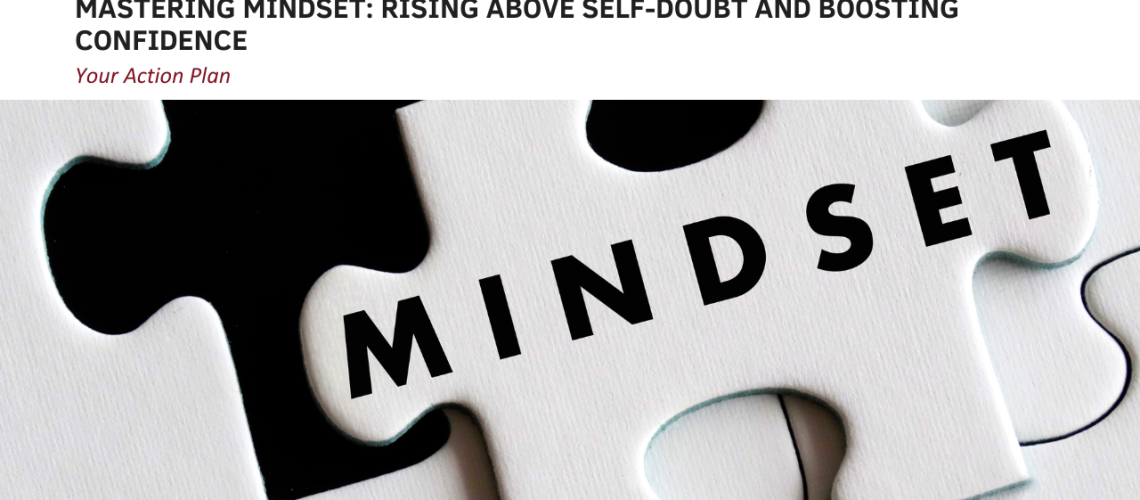By Dr. Salam Slim Saad
Self-doubt is a common obstacle that prevents us from reaching our full potential. Whether it’s questioning our abilities, second-guessing our decisions, or feeling inadequate compared to others, self-doubt can undermine our confidence and hinder our success. However, the good news is that overcoming self-doubt is possible and achievable with the right strategies and mindset.
Whether you’re looking to excel in your career, pursue your passions, or simply live a more fulfilling life, join us as we explore the transformative journey of conquering self-doubt and unlocking your true potential.
Understanding The Root Causes Of Self-Doubt
When we start a path of self-discovery, we often have to peel back the layers of our minds to find the source of our greatest fears, and we look at how our experiences and the things that happen to us shape how we see ourselves and the world around us. Here are some factors that affect self-doubt.
- Childhood Experiences: Many of our beliefs and attitudes toward ourselves are formed during childhood, based on our interactions with caregivers, peers, and authority figures. Negative experiences such as criticism, rejection, or lack of validation can plant the seeds of self-doubt that persist into adulthood.
- Comparison and Social Media: In today’s hyperconnected world, it’s easy to fall into the trap of comparing ourselves to others, especially on social media platforms where everyone’s highlight reels are on display. Constantly measuring ourselves against others can erode our confidence and fuel feelings of inadequacy.
- Perfectionism: The relentless pursuit of perfection can be a major source of self-doubt, as it sets unrealistic standards that are impossible to meet. Perfectionists often fear failure and criticism, leading to a cycle of self-doubt and procrastination.
- Imposter Syndrome: Imposter syndrome is a phenomenon where individuals doubt their accomplishments and fear being exposed as frauds despite evidence of their competence and success. It often stems from a fear of failure or the belief that one is not deserving of success.
- Negative Self-Talk: Our internal dialogue has a powerful impact on our self-esteem and confidence. Negative self-talk, such as criticizing ourselves or predicting failure, can perpetuate feelings of self-doubt and undermine our belief in our abilities.
Overcoming Negative Self-Talk And Limiting Beliefs
Negative self-talk and limiting beliefs can be insidious barriers to personal growth and fulfillment. They undermine our confidence, stifle our ambitions, and hold us back from reaching our full potential. However, by learning to recognize and challenge these destructive patterns of thinking, we can develop a more positive mindset and unlock new possibilities in our lives.
- Recognize Negative Self-Talk: The first step in overcoming negative self-talk is to become aware of it. Pay attention to the thoughts that run through your mind and notice when they turn negative or critical. Keep a journal to track your thoughts and identify recurring patterns of negative self-talk.
- Challenge Negative Thoughts: Once you’ve identified negative self-talk, challenge it with evidence and logic. Ask yourself if there’s any real basis for these negative beliefs or if they’re simply distortions of reality. Replace negative thoughts with positive affirmations or reframes that reflect a more balanced and realistic perspective.
- Practice Self-Compassion: Treat yourself with kindness and compassion, especially when facing challenges or setbacks. Remember that everyone makes mistakes and experiences failures—it’s a natural part of the learning process. Offer yourself the same level of understanding and support that you would give to a friend in a similar situation.
- Set Realistic Goals: Set achievable goals that align with your values and interests. Break larger goals down into smaller, manageable tasks, and celebrate each step of progress along the way. Setting realistic goals helps build confidence and momentum, making it easier to overcome self-doubt and limiting beliefs.
- Surround Yourself with Positivity: Surround yourself with positive influences that uplift and inspire you. Spend time with supportive friends and family members who believe in your abilities and encourage you to pursue your goals. Seek out motivational books, podcasts, or online communities that promote a positive mindset and provide encouragement and inspiration.
- Challenge Your Limiting Beliefs: Identify any limiting beliefs that may be holding you back from reaching your full potential. Ask yourself where these beliefs come from and whether they’re based on factual evidence or simply assumptions or misconceptions. Challenge these beliefs by seeking out counterexamples or reframing them in a more empowering light.
- Practice Visualization and Affirmations: Use visualization techniques to imagine yourself succeeding and achieving your goals. Visualize yourself overcoming obstacles, persevering in the face of challenges, and ultimately reaching your desired outcome. Pair visualization with positive affirmations that reinforce your belief in yourself and your abilities.
Building a Positive Support System: Tips for Seeking Help When Needed
In life, we all face challenges that can feel overwhelming at times. Whether it’s navigating a career change, dealing with personal setbacks, or coping with stress and anxiety, having a positive support system can make all the difference. Building a network of supportive friends, family members, and mentors can provide invaluable encouragement, guidance, and perspective during difficult times.
Cultivate Meaningful Relationships:
- Invest time and effort in nurturing relationships with people who uplift and support you. Surround yourself with individuals who genuinely care about your well-being and who you can trust to offer non-judgmental support and encouragement.
- Be proactive in reaching out to friends and family members, even during times when you may not feel particularly vulnerable. Regular communication and connection help strengthen relationships and create a sense of mutual support.
Be Authentic:
- Don’t be afraid to show vulnerability and share your struggles with trusted individuals in your support system. Authenticity fosters deeper connections and allows others to offer meaningful support and empathy.
- Remember that vulnerability is a sign of strength, not weakness. By opening up about your challenges, you give others permission to do the same and create a safe space for mutual support and understanding.
Seek Diverse Perspectives:
- Build a support system that includes individuals with diverse backgrounds, experiences, and perspectives. Different viewpoints can offer valuable insights and alternative solutions to problems you may be facing.
- Be open to learning from others and seeking guidance from mentors or role models who have navigated similar challenges successfully. Their wisdom and advice can provide invaluable guidance and inspiration.
Set Boundaries and Prioritize Self-Care:
- Establish clear boundaries with your support network to ensure that you’re receiving the help and support you need without feeling overwhelmed or overburdened.
- Remember to prioritize self-care and make time for activities that nourish your mind, body, and soul. Taking care of yourself enables you to show up fully for others and be a source of strength and support in return.
Know When to Seek Professional Help:
- Recognize when your challenges or struggles require professional assistance, such as therapy or counseling. Seeking help from trained professionals is a sign of strength and demonstrates a commitment to your mental and emotional well-being.
- Don’t hesitate to reach out for help if you’re experiencing symptoms of anxiety, depression, or other mental health issues. There are resources and support available to help you navigate these challenges and regain a sense of balance and stability in your life.
The Power Of Positive Affirmations And Visualization Techniques
By employing the power of positive affirmations and visualization techniques, we can rewire our minds for success and unlock our full potential.
- Start Your Day with Positive Affirmations: Begin each day on a positive note by reciting affirmations that resonate with you. These affirmations should be uplifting and empowering, reinforcing your belief in yourself and your abilities. Whether you repeat them aloud or silently to yourself, affirmations can set the tone for a productive and successful day ahead.
- Visualize Your Success: Visualization is a powerful technique that involves mentally rehearsing success scenarios in vivid detail. By visualizing yourself achieving your goals and overcoming obstacles, you can program your subconscious mind for success and cultivate a positive mindset.
- Create a Vision Board: A vision board is a visual representation of your goals, dreams, and aspirations. By creating a vision board and placing it in a prominent location where you can see it every day, you can stay focused and motivated to achieve your goals.
- Practice Gratitude: Gratitude is a powerful tool for cultivating a positive mindset and attracting abundance into your life. By focusing on the things you’re grateful for, you can shift your perspective from scarcity to abundance and cultivate a sense of contentment and fulfillment.
Taking Small Steps Towards Personal Growth And Achievement
The thought of making significant changes or pursuing goals can be scary, leading many to feel stuck or unsure of where to begin. However, by adopting a mindset of taking small, incremental steps, you can make meaningful progress toward your aspirations without feeling overwhelmed.
- Start with SMART Goals: Setting Specific, Measurable, Achievable, Relevant, and Time-bound (SMART) goals is a fundamental step in any journey of personal growth. Break down your larger aspirations into smaller, more manageable goals that you can work towards gradually. For example, if your ultimate goal is to run a marathon, start by setting smaller goals, such as running a certain distance each week or improving your pace over time.
- Create a Daily Habit Tracker: Tracking your progress can help you stay accountable and motivated on your journey towards personal growth. Create a daily habit tracker where you can record your small wins and track your consistency in practicing habits that align with your goals. Whether it’s reading for 20 minutes each day, practicing meditation, or exercising regularly, tracking your habits can help you stay on track and celebrate your progress along the way.
- Practice the Two-Minute Rule: The Two-Minute Rule is a simple yet effective productivity hack that can help you overcome procrastination and take small steps towards achieving your goals. The rule states that if a task takes less than two minutes to complete, you should do it immediately. By tackling small tasks as soon as they arise, you can prevent them from snowballing into larger, more daunting tasks, making it easier to stay productive and focused on your goals.
- Break Tasks into Micro-Steps: When faced with a daunting task or project, break it down into smaller, more manageable micro-steps. Instead of focusing on the entire project at once, identify the individual actions or tasks that need to be completed to move forward. For example, if your goal is to write a book, break the writing process down into smaller tasks such as outlining chapters, conducting research, and writing a certain number of words each day.
- Practice Gratitude and Positive Affirmations: Cultivating a positive mindset is crucial for personal growth and achievement. Take time each day to practice gratitude by reflecting on the things you’re thankful for and acknowledging your progress, no matter how small. Additionally, incorporate positive affirmations into your daily routine to reinforce your belief in yourself and your ability to achieve your goals. Repeat affirmations such as “I am capable of achieving my dreams” or “I am making progress towards my goals” to boost your confidence and motivation.
Conquering self-doubt and boosting confidence is not just about achieving personal success; it’s about living a fulfilling and empowered life. By recognizing and challenging self-limiting beliefs, setting achievable goals, practicing self-compassion, visualizing success, surrounding ourselves with supportive people, and prioritizing self-care, we can overcome the obstacles that stand in the way of our confidence and happiness. It’s important to remember that self-doubt is a natural part of the human experience, but it doesn’t have to define us. With the right mindset and strategies, we can rise above self-doubt and unlock our full potential. I encourage you to apply what you’ve learned from this post to your life. Start small, be patient with yourself, and celebrate your progress. Together, we can conquer self-doubt and embark on self-discovery and personal growth. Remember, you are capable, you are worthy, and you are enough.



